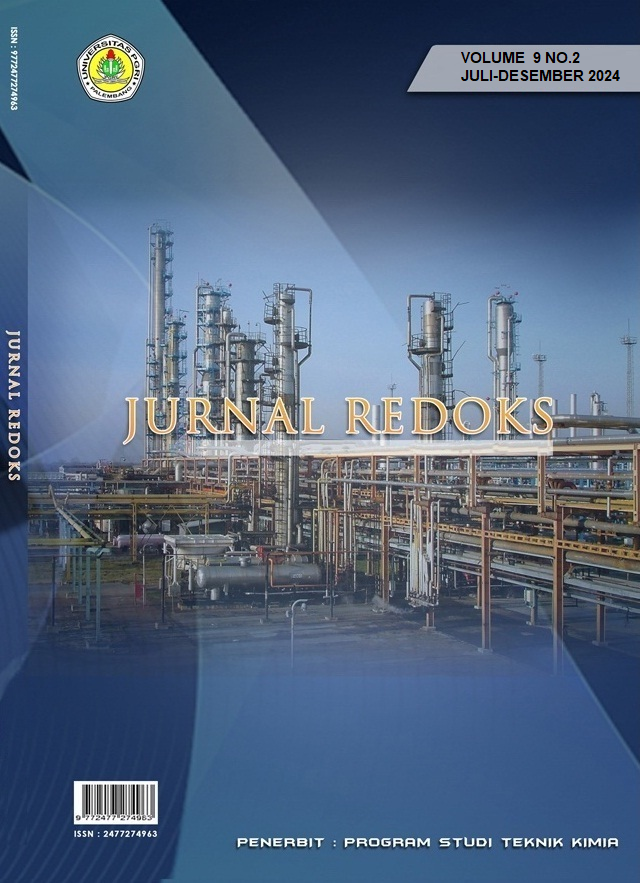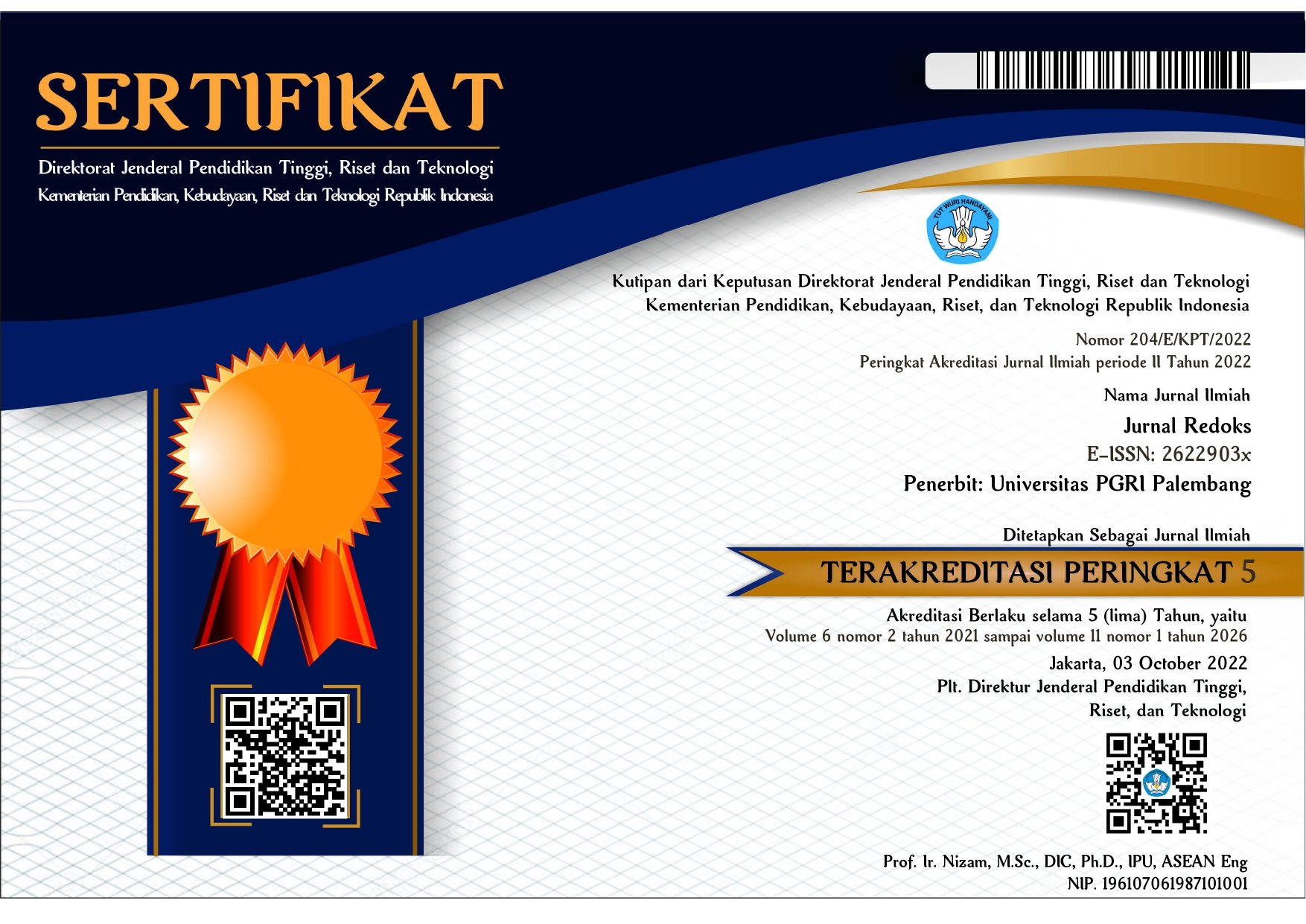Pengaruh Air Daur Ulang dalam Hydrothermal Treatment Biomassa Benih Kacang Panjang (Vigna Sinensis L) terhadap Komposisi Kimia dan Sifat Fisik Produk Cair
DOI:
https://doi.org/10.31851/redoks.v9i2.16137Keywords:
Benih Kacang Panjang, Biomassa, Hydrothermal Treatment, Daur UlangAbstract
Dalam dunia industri pertanian, biomassa menjadi produk samping yang sangat berlimpah dan dapat menjadi sumber energi dalam proses konversi. Salah satu biomassa berasal dari benih kacang panjang tidak layak atau rejected sehingga berakhir menjadi limbah padat. Hydrothermal Treatment merupakan salah satu teknik konversi biomassa menghasilkan sumber energi namun kendala dari proses hydrothermal treatment adalah produk samping berupa air dari proses pemanasan yang berlebihan serta mengandung beberapa senyawa kimia. Penelitian ini bertujuan untuk menganalisis kandungan senyawa pada air dari hasil produk samping hydrothermal treatment biomassa benih kacang panjang dengan daur ulang air (recycle) sebagai tambahan untuk proses selanjutnya sebanyak 250 mL dan dilakukan 5 kali recycle dengan variasi temperatur yang digunakan 200℃ dan 220℃, rasio biomassa dan air sebesar 1:5 dengan residence time selama 60 menit. Hasil produk cair yang dianalisis dengan Gas Chromathography Mass Spectrometry menunjukkan bahwa kandungan senyawa 11-Octadecanoic Acid terdeteksi pada suhu 200℃ dan 220℃ pada daur ulang pertama dan kelima.
References
Hu, Y., Feng, S., Yuan, Z., Xu, C. C., & Bassi, A. (2017). Bioresource Technology Investigation of aqueous phase recycling for improving bio-crude oil yield in hydrothermal liquefaction of algae. Bioresource Technology, 239, 151–159. https://doi.org/10.1016/j.biortech.2017.05.033
Kang, Y., Yang, Q., Bartocci, P., Wei, H., Liu, S. S., Wu, Z., Zhou, H., Yang, H., Fantozzi, F., & Chen, H. (2020). Bioenergy in China: Evaluation of domestic biomass resources and the associated greenhouse gas mitigation potentials. Renewable and Sustainable Energy Reviews, 127. https://doi.org/10.1016/j.rser.2020.109842
Kober, T., Schiffer, H. W., Densing, M., & Panos, E. (2020). Global energy perspectives to 2060 – WEC’s World Energy Scenarios 2019. Energy Strategy Reviews, 31, 100523. https://doi.org/10.1016/J.ESR.2020.100523
Kumar, S. (2014). Hydrothermal Processing of Biomass for Biofuels. In Biofuel Research Journal (Vol. 2).
Kurniasari, D., Yuliansyah, A. T., & Purnomo, C. W. (2020). The effect of process water recycle on hydrothermal treatment of yard long bean (Vigna unguiculata ssp. sesquipedalis) and water spinach (Ipomoea reptans) seeds. IOP Conference Series: Materials Science and Engineering, 857(1). https://doi.org/10.1088/1757-899X/857/1/012004
Li, C., Zhang, G., Zhang, Z., Ma, D., Wang, L., & Xu, G. (2015). Hydrothermal pretreatment for biogas production from anaerobic digestion of antibiotic mycelial residue. Chemical Engineering Journal, 279, 530–537. https://doi.org/10.1016/j.cej.2015.05.073
Libra, J. A., Ro, K. S., Kammann, C., Funke, A., Berge, N. D., Neubauer, Y., Titirici, M. M., Fühner, C., Bens, O., Kern, J., & Emmerich, K. H. (2011). Hydrothermal carbonization of biomass residuals: A comparative review of the chemistry, processes and applications of wet and dry pyrolysis. Biofuels, 2(1), 71–106. https://doi.org/10.4155/bfs.10.81
McKendry, P. (2002). Energy production from biomass (part 1): overview of biomass. Bioresource Technology, 83(1), 37–46. https://doi.org/10.1016/S0960-8524(01)00118-3
Ojewumi, M. E., & Chen, G. (2024). Hydrochar Production by Hydrothermal Carbonization: Microwave versus Supercritical Water Treatment. Biomass, 4(2), 574–598. https://doi.org/10.3390/biomass4020031
Pamujiati, A. D., & Hadiyanti, N. (2021). Penyuluhan teknologi penyimpanan benih kacang panjang sebagai upaya menanggulangi hama pasca panen di Desa Klepek Kecamatan Kunjang Kabupaten Kediri. In Jatimas : Jurnal Pertanian dan Pengabdian Masyarakat (Vol. 1, Issue 1). http://ojs.unik-
Petrović, J., Ercegović, M., Simić, M., Koprivica, M., Dimitrijević, J., Jovanović, A., & Janković Pantić, J. (2024). Hydrothermal Carbonization of Waste Biomass: A Review of Hydrochar Preparation and Environmental Application. In Processes (Vol. 12, Issue 1). Multidisciplinary Digital Publishing Institute (MDPI). https://doi.org/10.3390/pr12010207
Rodriguez Correa, C., Hehr, T., Voglhuber-Slavinsky, A., Rauscher, Y., & Kruse, A. (2019). Pyrolysis vs. hydrothermal carbonization: Understanding the effect of biomass structural components and inorganic compounds on the char properties. Journal of Analytical and Applied Pyrolysis, 140, 137–147. https://doi.org/10.1016/J.JAAP.2019.03.007
Singh, H., Jamie, K., & Animesh, M. (2017). Process Water from the Hydrothermal Carbonization of Biomass : A Waste or a Valuable Product ? Waste and Biomass Valorization, 0(0), 0. https://doi.org/10.1007/s12649-017-9914-0
Stemann, J., & Ziegler, F. (2011). 19th European Biomass Conference and Exhibition, 6-10 June 2011, Berlin, Germany. June, 6–10.
Suprihati. (2024, January 26). Sepanjang Tahun 2023 PLN EPI Serap 1 Juta Ton Biomassa Untuk Co Firing PLN. Https://Www.Plnepi.Co.Id/Media-Informasi/Ruang-Media/Siaran-Pers/Sepanjang-Tahun-2023-Pln-Epi-Serap-1-Juta-Ton-Biomassa-Untuk-Co-Firing-Pln#:~:Text=Energi%20bersih%20yang%20dihasilkan%20dari,Tahun%202022%20sebesar%20575%20GWh.
Tan, X., Liu, Y., Zeng, G., Wang, X., Hu, X., Gu, Y., & Yang, Z. (2015). Application of biochar for the removal of pollutants from aqueous solutions. In Chemosphere (Vol. 125, pp. 70–85). Elsevier Ltd. https://doi.org/10.1016/j.chemosphere.2014.12.058
Teoh, R. H., Mahajan, A. S., Moharir, S. R., Abdul Manaf, N., Shi, S., & Thangalazhy-Gopakumar, S. (2024). A review on hydrothermal treatments for solid, liquid and gaseous fuel production from biomass. Energy Nexus, 14, 100301. https://doi.org/10.1016/J.NEXUS.2024.100301
Uddin, M. H. (2016). Environmental Progress & Sustainable Energy. Environmental Progress & Sustainable Energy, 00(00), 1–10. https://doi.org/10.1002/ep
Downloads
Published
How to Cite
Issue
Section
License
Copyright (c) 2024 Devi Kurnia Sari, Rosalia Dwi Werena

This work is licensed under a Creative Commons Attribution-NonCommercial 4.0 International License.










